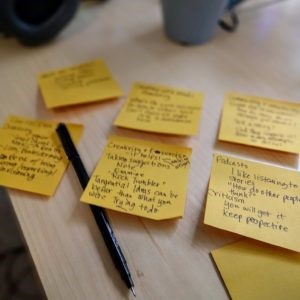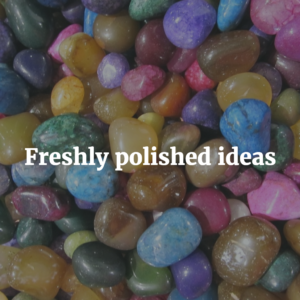Adaptive Joins and Memory Grants in SQL Server
Adaptive joins let the optimizer choose between a Hash Join and a Nested Loop join at runtime, which can be fantastic for performance when row count …
Read MoreAs a database administrator or developer, you’ll get into trouble fast if you try to force all your code and processes into a database shaped hole. You have to be creative when you problem solve – and when you communicate! So how do you cultivate creativity?
You can watch the 23 minute video, subscribe to the podcast, or scroll down and read the article.
Dear SQL DBA,
Where do you get your creativity from? I love your training sessions (first saw you in online training videos offered by my company) and I now read your blog, but what I love most here is your art!

Aww, thank you for the kind words!
This question meant a lot to me, because for years I only rarely devoted much time to purposefully being creative. And that was a mistake.
I went to a very small college - my graduating class was something like 13 students. A pretty high percentage of the people I studied with have become educators of different types.
Recently, one of my friends remarked that a group of Chemistry students she taught responded particularly well when she used cat drawings to go along with the lessons. They got more engaged with the class and wrote that the drawings helped them remember some fairly dry material.
And that got me thinking. Over the years, I’ve gotten two complaints about using my drawings in teaching SQL Server concepts – they basically felt my drawings were unnecessary and made the course seem childish.
I remember those criticisms very specifically. I know exactly which courses they were about, and how they were submitted. I’ve felt a lot of self-doubt over them.
What I tend to forget are the far greater number of verbal and written comments that I’ve gotten saying:
A lot of people were essentially telling me that creativity should be my personal “brand”, but I let two criticisms feel “louder” than the much greater volume of positive messages when it came to my drawings.
To be clear, I’ve gotten plenty of criticism about other aspects to my presentations– technical content, teaching mechanics, clarity, etc. I don’t remember all the details of those negative comments because I didn’t take that criticism quite as personally. It was easier for me to learn from the comment, make adjustments, and get better (which is the whole point of criticism).
I was just too vulnerable for a while when it came to my drawings. It’s a very personal area for a lot of us.
Be aware that the biggest friction may come from within when it comes to creativity. The main reason I’ve seen that people don’t draw is that they tell themselves that they can’t draw. What that really means is that they can’t accept and enjoy the imperfections that they see in their drawings.
If you want to be more creative, you’ve got to get past your own “I can’t” voice – whether it’s drawing or problem solving.
Database developers and administrators do a lot of problem solving. Creativity is huge when it comes to solving problems for data:
Communication is a bigger part of the DBA job than most people realize when they go into it. Creativity can also come into play when getting communication and processes to work.
If you regularly think of new ways to approach people and business problems, you’ll have an easier time as a DBA.
If you just try hitting the same nail with the same hammer, you’ll end up frustrated and with some bruises.
For me, creativity and stress are polar opposites. The more stressed I am, the less creative I am. And vice versa.
If I sit down and say, “I’m going to be creative” when I’m stressed, it doesn’t work. Worries just rotate through my head.
There’s one big thing that helps me: exercise.
Seriously, physical exercise. Of your body. Not your brain. Sounds weird, but it really works for me:
For me, it doesn’t have to be a specific form of exercise. I love to walk each day, and walking is hugely beneficial for my creativity – whether I’m going slow or fast. I often find myself jotting down notes when I get home for a walk, or suddenly thinking of a new idea within a couple of hours of working out.
Internet tradition: consult your doctor before starting a new whatever regimen. I am not a doctor and I do not play one on television.
Very often, my best ideas, presentations, and drawings come from tangents. I’ll be working on Problem X when I discover Tangent Y. And Tangent Y ends up being far more compelling.
Sometimes I work the tangent into my current project.
Sometimes I make notes and remind myself to build it into its own project.
The key is to write down those tangents.
These days I like to keep a mess of ideas and lists in Google Keep, because it’s free and I use an Android phone. Any kind of list works, from a simple text file on up. I have Keep lists for:
I sometimes make a mess of post it notes on my desk and herd them into a legit list later. Whatever works for you in the moment is what works!

The SQLPASS conference is next week. When you meet new people at a conference, one of the ways to break the ice is to ask them simple questions about themselves. (Yeah, I’m socially awkward enough that I remind myself of things like this.)
Instead of asking, “What do you do?”, you may get a more interesting answer if you ask, “What kind of problems do you get to solve?”
Because software developers and database folks get to solve all sorts of cool problems! That’s what a bunch of the sessions are, as well.
I think of my creative brain as being kind of like a rock tumbler. The more information you can take in from others about solving problems, the more ‘grit’ you have in your rock tumbler to smooth out problems.
Got a secret? Even if it’s not one simple trick, I’d love to hear about it in the comments.
Copyright (c) 2025, Catalyze SQL, LLC; all rights reserved. Opinions expressed on this site are solely those of Kendra Little of Catalyze SQL, LLC. Content policy: Short excerpts of blog posts (3 sentences) may be republished, but longer excerpts and artwork cannot be shared without explicit permission.